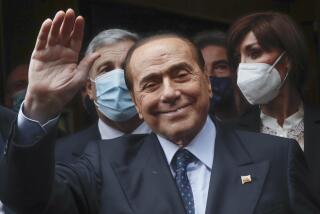NEWS ANALYSIS : Italy Ends Year of Hope Where It Started : Politics: Premier who promised rebirth fell as fast as he rose. Nation again lacks strong government.
ROME — An extraordinary political year limps to a close in Italy today amid dispiriting national recognition that, after months of great ferment and hope, nothing at all has changed. The actors are new but not the plot: There is no effective government or much prospect of one arriving any time soon.
As President Oscar Luigi Scalfaro pokes through the debris of a billionaire’s dream gone wrong, it is not clear whether 1995 will bring new elections or a tortured attempt to forge another coalition government.
Prime Minister Silvio Berlusconi, who resigned Dec. 22 when his right-wing coalition fractured, remains as a caretaker until Scalfaro decides what to do.
Berlusconi, the 58-year-old media tycoon and novice politician who improbably rose to power overnight and fell almost as fast, is demanding new elections.
On Friday, Scalfaro, a Christian Democratic old-timer who is now officially nonpartisan, completed a round of consultations with political leaders that was inconclusive but did not go Berlusconi’s way.
Scalfaro said his talks had provided “a clear and evident result: that a majority in Parliament say ‘No’ to immediate elections.”
The president said he would embark on a second round of talks next week.
Berlusconi, for his part, remains convinced that new elections will come in the spring--and that he will win them as he did last March’s vote, which was supposed to have signaled the rebirth of responsible politics after decades of corrupt cronyism among a handful of entrenched mainline parties.
“Despite maneuvering by our opponents, I’m convinced we can do it,” Berlusconi told the Spanish newspaper El Mundo.
Scalfaro’s difficulty will now be to come up with something approaching a functioning coalition. A key question is who will head it.
By some accounts, Scalfaro may turn toward an interim, apolitical government of technicians who would administer the country and carry out electoral reforms. That is precisely where Italy stood one year ago after a corruption scandal eviscerated parties that had shared power for more than four decades.
After the first-round talks ended Friday, analysts saw virtually no chance that Scalfaro would ask Berlusconi himself to try to form a new government. Berlusconi’s Forza Italia, or “Go, Italy,” and its neo-Fascist allies in the National Alliance are substantially alone in wanting new elections.
The third coalition pillar, the Northern League--led by populist-federalist Umberto Bossi, whose split with Berlusconi brought the government down--wants a new coalition rather than elections.
Bossi rebelled against what he called Berlusconi’s failure to follow through on electoral promises to promote federalism and to enact antitrust laws that would have forced him to divest at least part of his media empire.
Centrist parties that rose from the ashes of the disgraced former Christian Democrats hope for a share of power in any new coalition. So do the leftist former Communists, who have been the country’s second-largest political movement since World War II but have never shared national power.
Although Berlusconi’s foes can muster a mathematical majority in both houses of Parliament, he is counting on their inability to agree on policies.
*
Berlusconi entered politics a year ago to head off what he saw as a certain victory by the former Communists in the spring elections. The gamble worked. Voters disgruntled by the scandal-tarred parties they had been electing since World War II turned to free-market Berlusconi rather than the former Communists, now officially social democrats.
The right-wing government proved short-lived. Installed in May with promises of a million new jobs and economic reforms to reduce Italy’s huge public deficit, it ran into trouble almost immediately.
By the time Bossi broke openly, Berlusconi had been forced to surrender to union demands to soften key economic measures and had also lost popular support as measured in recent local elections.
More to Read
Sign up for Essential California
The most important California stories and recommendations in your inbox every morning.
You may occasionally receive promotional content from the Los Angeles Times.









